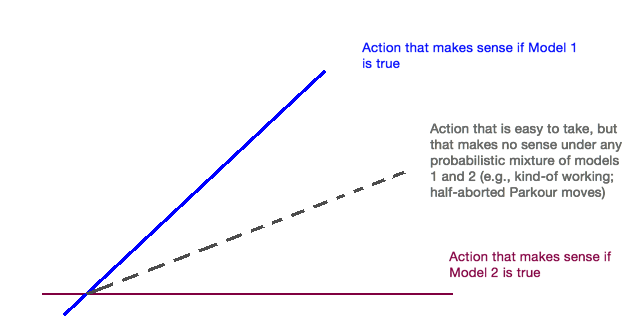Related to: Half-assing it with everything you've got; Wasted motion; Say it Loud.
Once upon a time (true story), I was on my way to a hotel in a new city. I knew the hotel was many miles down this long, branchless road. So I drove for a long while.

After a while, I began to worry I had passed the hotel.

So, instead of proceeding at 60 miles per hour the way I had been, I continued in the same direction for several more minutes at 30 miles per hour, wondering if I should keep going or turn around.

- I wasn't sure if I was a good enough writer to write a given doc myself, or if I should try to outsource it. So, I sat there kind-of-writing it while also fretting about whether the task was correct.
- (Solution: Take a minute out to think through heuristics. Then, either: (1) write the post at full speed; or (2) try to outsource it; or (3) write full force for some fixed time period, and then pause and evaluate.)
- I wasn't sure (back in early 2012) that CFAR was worthwhile. So, I kind-of worked on it.
- An old friend came to my door unexpectedly, and I was tempted to hang out with her, but I also thought I should finish my work. So I kind-of hung out with her while feeling bad and distracted about my work.
- A friend of mine, when teaching me math, seems to mumble specifically those words that he doesn't expect me to understand (in a sort of compromise between saying them and not saying them)...
- Duncan reports that novice Parkour students are unable to safely undertake certain sorts of jumps, because they risk aborting the move mid-stream, after the actual last safe stopping point (apparently kind-of-attempting these jumps is more dangerous than either attempting, or not attempting the jumps)
- It is said that start-up founders need to be irrationally certain that their startup will succeed, lest they be unable to do more than kind-of work on it...


Reminds me of the motto "Strong Opinions, Weakly Held". There's no point having a blurry opinion, or not expressing what you believe to be the most likely candidate for a good way forward, even if it's more likely by only a small margin. By expressing (and/or acting on) a clearly expressed, falsifiable opinion, you expose it to criticism, refutation, improvement, etc. And if you hold it weakly, then you will be open to reconsidering. Refusing to make up your mind, and kindof oscilating between a few options, perhaps waiting to see where the wind blows, has its advantages, but especially when it comes to getitng things done, is most often a clear loser. Despite this, our brains seem to prefer it instinctively, maybe due to some ancestral environment echoes about being proven wrong in the eyes of the tribe?